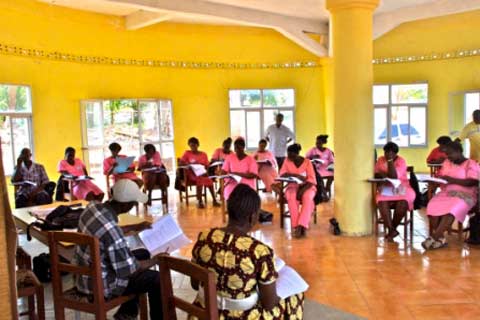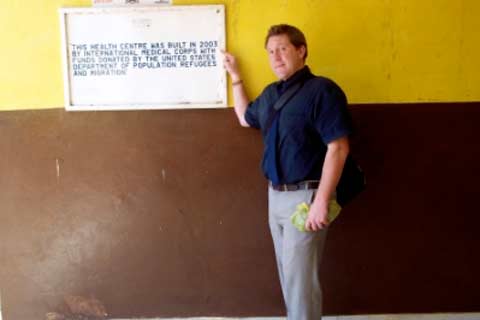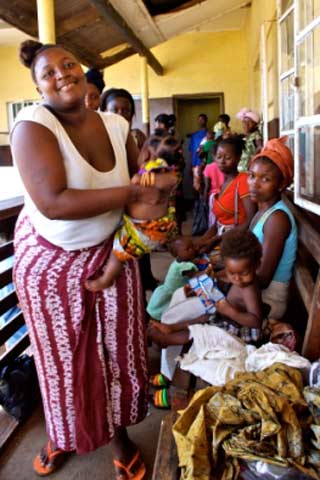It has been more than a decade since Sierra Leone’s brutal civil war ended. But the widespread violence and displacement that resulted from eight years of conflict have left the country with a daunting rebuilding process and some of the worst mortality rates in the world: nearly one in five babies dies before his or her first birthday; one in eight women dies during childbirth; and life expectancy is just 41 years old.
International Medical Corps has worked for over a decade in Sierra Leone to provide medical interventions and training programs to strengthen local capacity. The organization is well-known in the country as a professional, high-quality, rapid responder for its work in both emergency relief and long-term development. Today, one of its key interventions is a five-year program to improve long-term health and nutrition for more than 50,000 children and mothers through ACDI/VOCA’s Sustainable Nutrition and Agriculture Promotion (SNAP), funded by USAID’s Food for Peace.
“There is just so much to do to build the health care system for the people of Sierra Leone,” said International Medical Corps’ Sierra Leone Country Director Wes Wrightson, who has worked in Sub-Saharan Africa for 12 years. “SNAP is a huge part of what we do here, but we are also constantly researching new opportunities for intervention, ranging from specific health care programs in village communities to working alongside the Ministry of Health at a national level.”
To witness Wrightson at work is to get a tangible sense that there is no time to waste in Sierra Leone’s development. Wrightson is a living example of “Never put off ‘till tomorrow what you can do today’ and leads the Freetown team by example with constant, focused, and affable energy,
International Medical Corps’ reputation in Sierra Leone, forged through emergency relief and development projects across the country from 1999 to 2008, leaves it perfectly placed to work with the Ministry of Health to provide infrastructural investment and capacity-building opportunities for staff.
With the legacy of past successes in Kailahun, Kenema, and at the Princess Christian Memorial Hospital in Freetown, Wrightson says there is potential for developing other regional healthcare centers to solidify free health care at a district level.
“The government hospital in Bo is somewhere that we are looking at implementing a project together with Mercy Ships,” said Wrintson. “I met with the District Medical Officer of the hospital. We laid out a needs-based assessment – his wish list if you like – and that was pushed forward to Mercy Ships. We are working with them now to look at the best way forward.”
Another partnership that International Medical Corps is exploring is with The University of Makeni. A proposal for a research-based project is being finalized that would attach mental health modules to the university’s nursing program and train staff to receive and care for long-term inpatients at the institute.
“We’re looking to increase the breadth of the university’s training and share information and expertise with them as a local partner,” says Wrightson.
Through years of development experience in West Africa, Wrightson is all too aware of the need for mental health training and investment.
“This is a country recovering from war,” he said. “The population is shocked, and is trying to heal itself. There are traditional means to do that, and I know what this country can become through its natural recovery – but having said that, there are endless ways we can intervene to help.”
He continued: “For example, there’s no mental health training for nurses at a district level. There’s no referral system between traditional healers and primary health care units. We’ve done a complete holistic assessment and developed a strategy with both research and operational components. The strategy provides solutions to these specific issues through strengthening staff capacity.”



The stigma of mental health issues in Sierra Leone is a huge problem. Sufferers can be rejected by their families, shunned by their communities, and are extremely unlikely to be treated in tertiary or primary health care units.
International Medical Corps is refining a mental health care strategy and developing training for medical professionals that includes dealing with stigma. The program would encompass maternal depression with an emphasis on detecting mental health problems and working to de-stigmatize them.
Wrightson is proud of the continuing impact of International Medical Corps’ work in Sierra Leone and the proven longevity of project legacies across the country, but he is always looking for further opportunities for intervention.
“I’m happy with what we’ve established and handed over to the Ministry of Health, but maintenance?” he said. “That’s something different. It means training on archiving, documenting, [and] motivating staff with consistent salaries. It’s something that everyone’s working on, every NGO, every UN constituent and body, not just here, but everywhere. That’s why our work here, our ethos is so important. We always [are] looking for new interventions, but it’s essential to ensure that when we hand over a project, we’ve built the local capacity so that Sierra Leone can be self-sufficient, self-reliant, and self-resilient.”